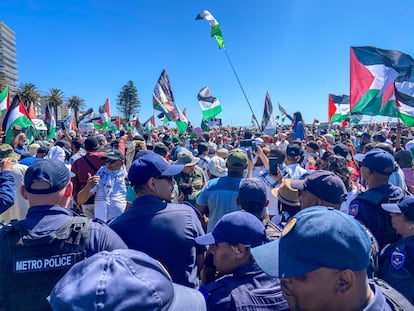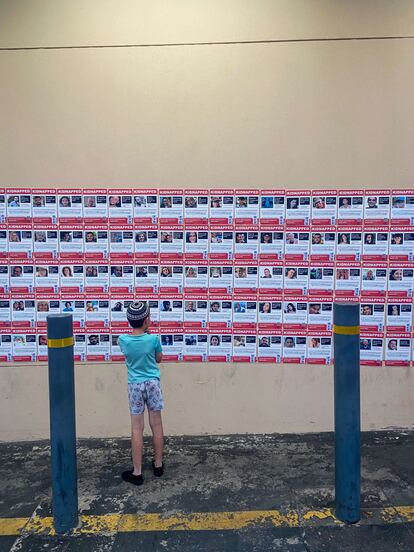South Africans support Palestinians: ‘What the residents of Gaza are experiencing now goes far beyond apartheid’
Through their own past of oppression, many people here stand firmly with the Palestinians. But there is also a large Jewish community in the country, and its members are feeling increasingly fearful

“Your parents fought against apartheid,” a young woman wearing a Palestinian flag for a headscarf shouted at a long wall of police officers, “and now you are doing the opposite! This is exactly what it was like during apartheid!” On a grassy field on Cape Town’s Seepunt promenade, thousands of demonstrators wearing Arafat scarves and Palestinian flags faced hundreds of police officers equipped with large plexiglass shields and bulletproof vests.
That same morning, an ‘interreligious prayer session’ had been scheduled to be held right here, in front of the stately apartment complexes of the predominantly Jewish seaside district. The Jewish organizer of the event wanted to show that Israel can also count on the support of South Africa. “For Zion’s sake we will not be silent,” could be read on their flyers, which were distributed via WhatsApp in recent days.
But as soon as those messages reached Cape Town’s large pro-Palestinian movement, thousands of demonstrators carrying Palestinian flags marched to Seepunt. Even before the prayer session could start, the handful of pro-Israel demonstrators were escorted from the field by the officers present, for fear of a violent confrontation. And the buses full of pro-Israel demonstrators who had arrived from elsewhere were forced to turn around on orders from the police.
Since the outbreak of the war between Israel and Hamas, demonstrations have been taking place almost every day in several parts of South Africa, while the government has also remained anything but aloof. “As a people and as an organization who have fought against an oppressive apartheid regime, we pledge solidarity with the Palestinian people,” President Cyril Ramaphosa said in a speech on October 15.
It only takes one malicious person who thinks that, emboldened by the president’s radical words, he can attack JewsKaren Milner, South African Jewish Council
To reinforce that statement, Ramaphosa’s government withdrew its diplomatic mission from Israel on November 8, calling the bombing of Gaza a “genocide.” After that, South Africa even filed a case with the International Court of Justice in The Hague. During that the hearings that have been ongoing so far, South Africa explained why it thinks Israel is violating the 1948 Genocide Convention, and why the court must take ‘provisional measures’ as quickly as possible to stop Israel from further bombing Gaza, where over 25,000 people have died according to local authorities. A decision is expected on Friday.
The South African stance is understandable from the perspective of the country’s recent history: In South Africa (which is located about 9,000 kilometers from Gaza), people sympathize with the Palestinians. ‘We went through the same thing not so long ago. Their struggle touches my heart,” said Alie Komape, campaign manager for Africa4Palestine, an organization that regularly organizes pro-Palestinian rallies. On the back of Komape’s Free Palestine shirt is a quote from anti-apartheid fighter Nelson Mandela: ‘Our freedom is incomplete without the freedom of the Palestinians.”

Even after the abolition of apartheid in 1994, the ties between the South African anti-apartheid organization ANC and the Palestinian liberation organization PLO remained close.
In recent decades, according to Komape, both parties have been “united in their struggle against apartheid and oppression.” That there is also contact between the contemporary ANC and the radical Islamic group Hamas that governs Gaza became apparent when the ANC Minister for International Relations called Hamas leader Ismail Haniyeh on October 18, claiming to discuss humanitarian aid.
The telephone call is seen by South African opposition parties as undeniable support for Hamas. Komape hints that he would not mind such support. “Many people seem to have forgotten that the ANC also committed attacks,” he says. “As South Africans, we know better than anyone that you must use violence against an oppressive regime that only understands violence.”
Israel has copied and perfected the South African system of apartheidImraan Moosa, activist and demonstrator
At demonstrations, pro-Palestinian demonstrators demand sanctions against Israel and call for boycotts of pro-Israeli businesses — no other African country trades with Israel as much as South Africa. According to Komape, the protests have nothing to do with anti-Semitism. “There is no hatred of Jews here,” he says firmly, “That is a European problem. When the Holocaust was committed in Europe, we were already fighting against apartheid. To me, members of the Jewish community are nothing more than white people.”
The activists hope that their protests will provoke a response from the international community, like the one that followed the South African struggle against apartheid. “We want the international community to turn against Israel,” Komape says, “as they did after the Soweto uprising against the white government here.”
During that uprising, on June 16, 1976 in the Johannesburg township of Soweto, the police shot live ammunition at a peaceful student protest. Hundreds of people were killed at the rally and subsequent demonstrations. The international shock caused by the police violence put so much pressure on the apartheid government that the events are seen as the tipping point that led to the abolition of apartheid.
In Johannesburg, which is about 1,200 kilometers northeast of Cape Town, many experienced the Soweto uprising up close. In the southern suburb of Lenasia (which borders Soweto), this translated into a small-scale pro-Palestine rally, held on a recent day in a park. About 40 people were painting flags and banners that would later be hung along the highway. ‘Who kills a child every 10 minutes? Genocidal Israel’, four teenagers write on a large white canvas. With red paint they painted drops of blood dripping from the word ‘Israel’.
“Israel has copied and perfected the South African system of apartheid,” said Imraan Moosa, an older man attending the pro-Palestine meeting who fought as an activist against the apartheid regime in the 1970s. “But what the residents of Gaza are experiencing now goes far beyond apartheid. At least we South Africans were not bombed by the state.”
But there are also neighborhoods in Johannesburg where a different sentiment is felt. In Glenhazel, for example, a vast district full of heavily guarded villas where the lion’s share of South Africa’s Jewish community lives, the largest in Africa with 50,000 people. Here, particular attention is paid to the hostages who were kidnapped by Hamas, as is evident at the entrance to the Jewish supermarket Kosher World. There, women in long dresses and men with yarmulkes on their heads pause to take a look at the wall covered with hundreds of posters.
“Let’s have a look.” It takes a while before Zelda (she doesn’t want her last name to appear in print) finds the one she’s looking for. “Ah, look.” She points to the photo of Aviva Siegel, who was kidnapped by Hamas, it says. Aviva is a friend of her mother, Zelda says, and she often visited her parents. “She is a South African citizen,” Zelda continues, bewildered, “but you only hear from President Ramaphosa about the Palestinian cause.”
A few weeks ago, a pro-Palestinian group entered the neighborhood, where they tore down pamphlets depicting the faces of people kidnapped by Hamas. The event made a deep impression on many in the neighborhood. “We fear an attack,” says Karen Milner of the South African Jewish Council. “It only takes one malicious person who thinks that, emboldened by the president’s radical words, he can attack Jews.” Milner says her community is being harassed in the hopes that it will respond with violence. ‘It’s a word I don’t often use, but we used to call this Jew-baiting. We are deliberately being provoked.”
Around the corner from Kosher World, Benji Shulman, a representative of the South African Zionist Federation, is sitting in front of a large bowl of sweet potato fries with monkey gland sauce. The male Black employees of the snack bar are about the only ones here who do not wear a yarmulke. The others do not hide their religion.
The pressure on the Jewish community is increasing, says Shulman, but he thinks, like Komape, that the protests have little to do with anti-Semitism. He points to the other side of the street. “There is a Jewish school there,” he explains, “and unlike in Europe, there are no swastikas painted on the wall.” He is still safe in his neighborhood, even though concerns are increasing. “We don’t have to hide. Not yet,” Shulman says, nodding to the Jewish families sitting on the covered terrace. “But hate starts with words.”
Sign up for our weekly newsletter to get more English-language news coverage from EL PAÍS USA Edition
Tu suscripción se está usando en otro dispositivo
¿Quieres añadir otro usuario a tu suscripción?
Si continúas leyendo en este dispositivo, no se podrá leer en el otro.
FlechaTu suscripción se está usando en otro dispositivo y solo puedes acceder a EL PAÍS desde un dispositivo a la vez.
Si quieres compartir tu cuenta, cambia tu suscripción a la modalidad Premium, así podrás añadir otro usuario. Cada uno accederá con su propia cuenta de email, lo que os permitirá personalizar vuestra experiencia en EL PAÍS.
¿Tienes una suscripción de empresa? Accede aquí para contratar más cuentas.
En el caso de no saber quién está usando tu cuenta, te recomendamos cambiar tu contraseña aquí.
Si decides continuar compartiendo tu cuenta, este mensaje se mostrará en tu dispositivo y en el de la otra persona que está usando tu cuenta de forma indefinida, afectando a tu experiencia de lectura. Puedes consultar aquí los términos y condiciones de la suscripción digital.








































